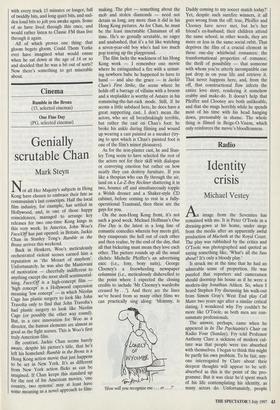Cinema
Rumble in the Bronx (15, selected cinemas) One Fine Day (PG, selected cinemas)
Genially scrutable Chan
Mark Steyn
Not all Her Majesty's subjects in Hong Kong have chosen to embrace their fate as communism's last conscripts. Half the local film industry, for example, has settled in Hollywood, and, in one of those happy coincidences, managed to arrange key releases for two one-time Kong kings in this very week. In America, John Woo's Face/Off has just opened; in Britain, Jackie Chan in Stanley Tong's Rumble in the Bronx arrives this weekend. Back in Honkers, Woo's meticulously orchestrated violent scenes earned him a reputation as 'the Mozart of mayhem'. Unfortunately, he was also the Mantovani of motivation — cheerfully indifferent to anything except the most shrill sentimental- ising. Face/Off is a high-concept film 'high concept' is a Hollywood expression meaning low concept' — in which Nicolas Cage has plastic surgery to look like John Travolta only to find that John Travolta's had plastic surgery to look like Nicolas Cage (or possibly the other way round). But, in a rare innovation for Woo as a director, the human elements are almost as good as the fight scenes. This is Woo's first truly American film. By contrast, Jackie Chan seems barely aware, despite his picture's title, that he's left his homeland: Rumble in the Bronx is a Hong Kong action movie that just happens to be set in New York. It's as different from New York action flicks as can be imagined. If Chan keeps this standard up for the rest of his American movies, 'one country, two systems' may at least have some meaning as a novel approach to film- making. The plot — something about the mob and stolen diamonds — need not detain us long, any more than it did in his Hong Kong pictures. As for Chan, he must be the least inscrutable Chinaman of all time. He's so genially scrutable, so eager and unabashed, that it's a bit like watching a seven-year-old boy who's had too much pop tearing up the playground.
The film lacks the wackiness of his Hong Kong work — I remember one movie where he extinguished a fire with a urinat- ing newborn babe he happened to have to hand — and also the grace — in Jackie Chan's First Strike, the scene where he holds off a barrage of villains with a broom and a stepladder is worthy of Astaire in his romancing-the-hat-rack mode. Still, if he seems a little subdued here, he does have a great supporting cast. I don't mean the actors, who are all breathtakingly terrible, but rather the cast on Chan's foot: he broke his ankle during filming and wound up wearing a cast painted as a sneaker (try- ing to spot which is Chan's painted foot is one of the film's minor pleasures).
As for the non-plaster cast, he and Stan- ley Tong seem to have selected the rest of the actors not for their skill with dialogue or conveying emotion but rather on how neatly they can destroy furniture. If you like a thespian who can fly through the air, land on a La-Z-Boy Recliner shattering it in two, bounce off and simultaneously topple a Welsh dresser and a Shaker-style CD cabinet, before coming to rest in a fully- operational Teasmaid, then these are the guys for you.
On the non-Hong Kong front, it's not such a good week. Michael Hoffman's One Fine Day is the latest in a long line of romantic comedies wherein boy meets girl, they exasperate the hell out of each other and then realise, by the end of the day, that all that bickering must mean they love each other. The picture rounds up all the usual clichés: Michelle Pfeiffer's an advertising exec (i.e., foxy, boxy suits), George Clooney's a freewheeling newspaper columnist (i.e., meticulously dishevelled to the point where I expected the closing credits to include 'Mr Clooney's wardrobe creased by . ..'). And there are the lines we've heard from so many other films we can practically sing along: 'Mommy, is `How will you recognise me . . . er . . .?' Daddy coming to my soccer match today?' Yet, despite such surefire winners, it all goes wrong from the off: true, Pfeiffer and Clooney have never met, but he's her friend's ex-husband; their children attend the same school; in other words, they are more or less in the same social orbit. That deprives the film of a crucial element in these one-day whirlwind romances: the transformational properties of romance; the thrill of possibility — that someone with whom you're utterly incompatible can just drop in on your life and retrieve it. That never happens here, and, from the off, that constructional flaw infects the entire love story, rendering it somehow crabby and make-do. It doesn't help that Pfeiffer and Clooney are both unlikeable, and that she mugs horribly while he spends most of his time with his head hanging down, presumably in shame. The whole thing is filmed in Beige-O-Vision, which only reinforces the movie's bloodlessness.


























































 Previous page
Previous page